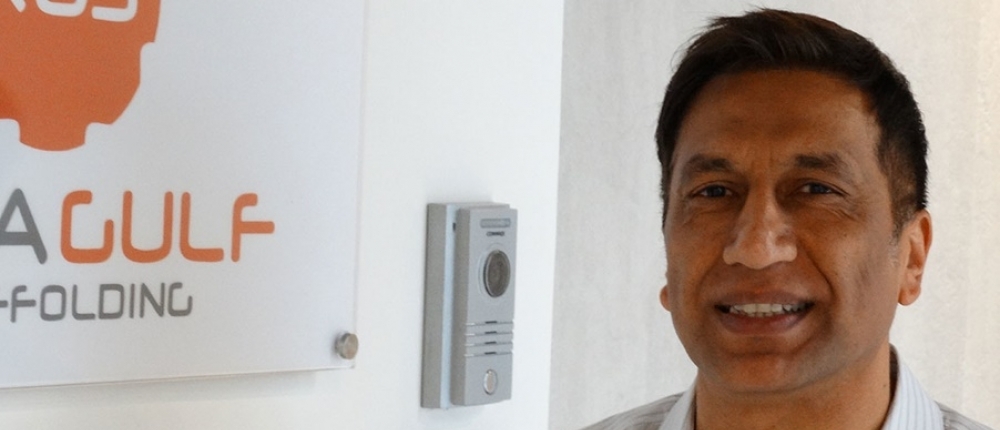by Disha Dadlani02 Jun 2020 With a remote way of working and digitalisation becoming the only way forward as businesses effectively tackle the impacts of the ongoing COVID-19 pandemic, Saudi Arabia’s Resa Gulf Scaffolding (RGS) has recognised the need to go digital and “re-appraised divisions within the business where previously digitalisation was not a priority.” However, the company identified the need of the hour prior to the outbreak of the pandemic, and is well on its way to achieve digital transformation, as part of its three-year “Good-to-great” framework. Speaking exclusively to Construction Week, RGS’ general manager, Ash T. Arshad, said: “We believe digitalisation of our services and development of our software are key elements to operational success. What’s changed now in response to the COVID-19 outbreak is that while our sales team previously relied heavily on site visits and face to face customer meetings, we have now developed a new remote sales development framework, using technologies like web conferencing and interactive data-share to engage our prospects and customers." While Arshad believes that the scaffolding sector has been slow to adapt to digital transformation, and slower still in applying innovative management techniques, the general manager has taken it upon himself to debunk his own statement. “Through our ‘Fit for Growth’ programme last year, which is part of RGS’ ‘Good-to-great’ journey, we recognised the need to cultivate a culture of learning and development within our workforce.” When RGS faced shortages of Saudi Aramco-certified personnel including supervisors, inspectors and work permit receivers (WPR), the company resorted to developing in-house training programmes to facilitate the employment of qualified personnel. “Our software allows our scaffolders to train remotely using their smart phones; they have the ability to take mock Aramco exams as many times as required. This training is supported by video demonstrations and detailed explanations on any aspect of their work. Increased salaries and bonus arrangements have become motivational factors for our teams to continue learning and improving,” Arshad told Construction Week, adding that post the success of the software, the company is considering taking it out to the market as a new revenue stream. Further boosting a culture of learning, training, and development within the company, RGS also developed a HR talent management software and appraisal system as part of its drive to create an “A Team”. The company rolled out a private social and professional network to some of its employees including select supervisors, quality, health, safety and environment managers, and salesmen at the start of the year. “The programme allows our staff to engage with one another on a one-on- one basis or at company-wide level. Engineering drawings can be shared and discussed live with on-site teams, and material management and productivity concerns can be assessed as required by site managers,” Arshad said. The software is “designed to encourage interaction and problem-solving between functional teams without intervention by senior staff, and so, senior personnel can enter conversations only if requested.” RGS is not stopping at the successful feedback of its private network and aims to “develop it further by introducing it to product manufacturers, suppliers and shareholders to allow international interaction and additional problem solving capabilities.” Along with digital transformation, RGS has also placed focus on strengthening its innovative leadership style for the year. The company has employed several programmes including PeX, which is a programme specific to RGS’ logistics department, that ensures timely deliveries, minimises risk of sending wrong material, and identifies product types. In addition, customer risk is managed through the company’s internally-developed matrix, which is based on regression and probability analysis. The risk model developed by the company facilitates informed decision-making. In an attempt to overcome any previously unforeseen site obstacles, RGS has made available the option to re-engineer real time solutions, and to control the amount of material actually required on site. The company developed a trackable material management system prototype which will allow its engineer and operations teams to remotely see the scaffolding structure being erected live on site. While RGS has voluntarily embraced digital transformation, it has also had to make certain changes in its operations, owing to the implications associated with the ongoing COVID-19 outbreak. Arshad told Construction Week: “Remote working in our industry is limited as the source of revenues is the supply, installation and dismantle of our own patented Resablok system scaffold and mast climbers. These site activities cannot be performed remotely. However, areas like design and engineering, can comfortably succeed; we are now running our sales and business development remotely.” The Kingdom of Saudi Arabia recently announced that it would implement an increase in the value-added tax rate (VAT) from 5% to 15% as part of its slew of measures that aim to offset the challenges associated with the COVID-19 outbreak in the kingdom. The announcement was made in view of the ‘shocks’ produced by the crisis, on the kingdom’s economy. Speaking about the impact of the kingdom’s decision on RGS’ operations and business, Arshad told Construction Week: “Although the VAT rate will be tripled on July 1 2020, our compliance costs will not increase because we already have the infrastructure in place, and therefore there will be no adverse effect on our operation. However, the outcome of the VAT rate increase will largely impact our cash flow. “
